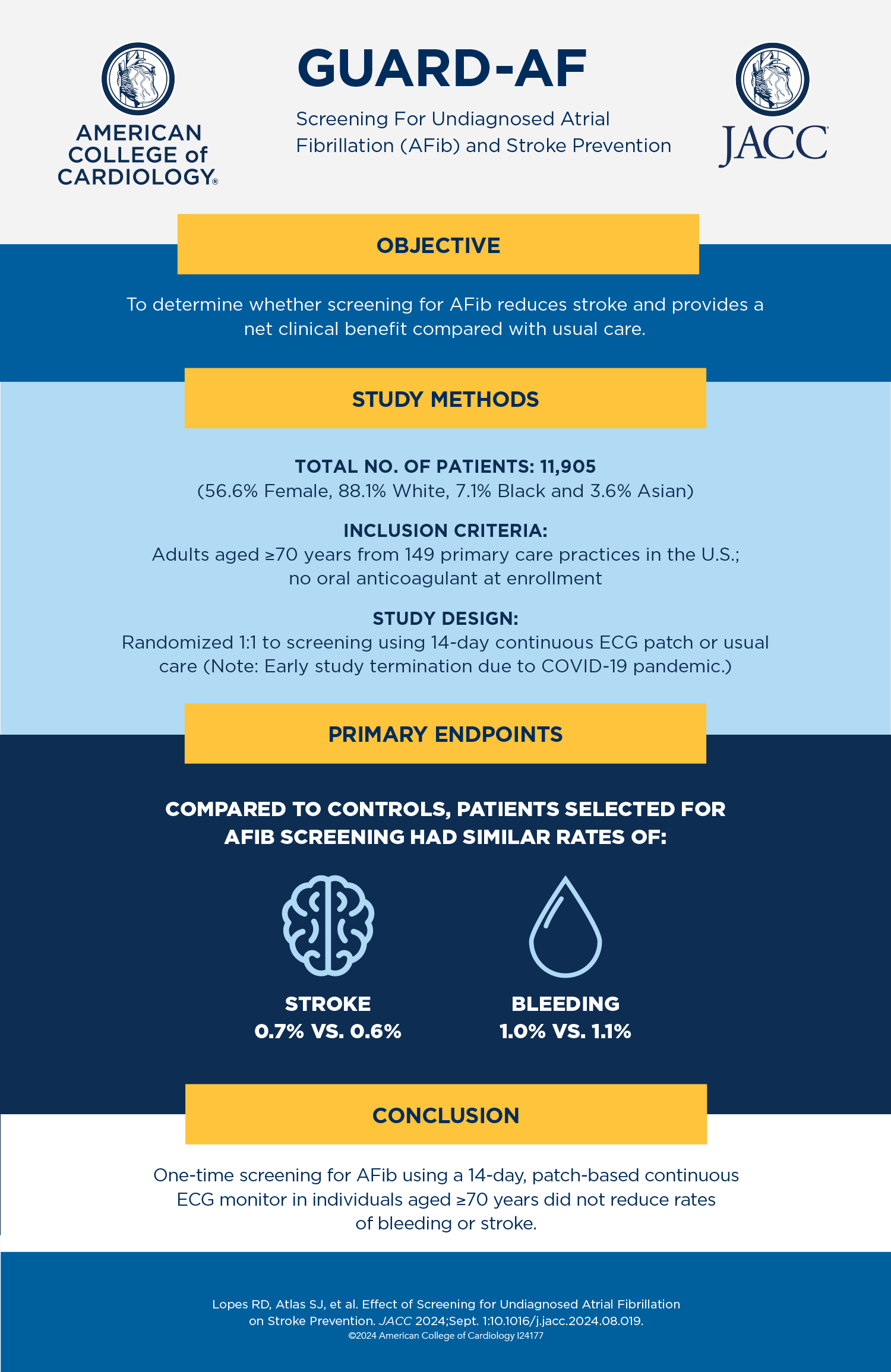GUARD-AF: Does Screening For Undiagnosed AFib Reduce Bleeding and Stroke Risk?
One-time screening for atrial fibrillation (AFib) using a 14-day, electrocardiographic (ECG) patch monitor in individuals aged ≥70 years did not reduce rates of bleeding or stroke, based on results from the GUARD-AF trial presented at ESC Congress 2024 in London and simultaneously published in JACC.
The trial, which was terminated early due to the COVID pandemic, randomized 11,905 individuals from 149 primary care sites in the U.S. to either screening or usual care. All participants were over the age of 70 (median age of 75) and 56.6% were female, 88.1% were White, 7.1% were Black and 3.6% were Asian. None of the participants were taking oral anticoagulants (OACs) at the time of enrollment. The primary efficacy and safety outcomes were hospitalization due to all-cause stroke and bleeding, respectively.
Over the median follow-up of 15.3 months, 37 participants in the screening group (0.7%) were hospitalized for stroke compared with 34 participants assigned to usual care (0.6%). The rate of bleeding was similar across both groups – 1.0% in the screening group compared with 1.1% in the usual care group. In addition, Renato D. Lopes, MD, PhD, FACC; Steven J. Atlas, MD, MPH, et al., note that ECG screening resulted in a 52% increase in AFib diagnosis, as well as an increase in the initiation of OACs.
Given several limitations to the trial, including its unexpected early termination, the researchers caution that their findings "should not be considered conclusive" and suggest that other large, ongoing AFib screening studies "may further help to clarify the role of AFib screening and to determine who, how, and when to screen for AFib for maximizing net clinical benefit." However, they also add that "despite these limitations, GUARD-AF is the largest randomized controlled trial to date of AFib screening in primary care practices across the U.S."
In a related editorial comment in JACC, Xiaoxi Yao, MPH, MS, PhD, FACC, and Peter A. Noseworthy, MD, explain, "the current study reinforces established knowledge that screening enhances the rate of diagnosis but it did not demonstrate a difference in stroke or major bleeding outcomes. Despite the premature termination at the behest of the funder, this trial still offers important and reassuring insights into the nature of screen-detected AFib."
In findings from the GUARD-AF Trial Screening Arm published in JACC: Clinical Electrophysiology, Daniel E. Singer, MD, et al., found that most AFib detected using 14-day patch ECG monitors in patients ≥70 years old was very low burden, i.e., a median of 0.48% time in AFib and longest episodes of less than 40 minutes. However, one-quarter of those with AFib had multiple hours of AFib, raising concern about stroke risk. "Specifying the relationship between higher burden AFib and stroke risk remains a critical research goal with broad implications for trials of AFib screening and for clinician response to increasingly common heart rhythm alerts from mobile devices," the authors conclude.
Clinical Topics: Cardiac Surgery, Invasive Cardiovascular Angiography and Intervention, Stable Ischemic Heart Disease, Vascular Medicine, Cardiac Surgery and SIHD, Interventions and Vascular Medicine, Chronic Angina
Keywords: ESC Congress, ESC24, Coronary Artery Bypass, Myocardial Infarction, ST Elevation Myocardial Infarction

